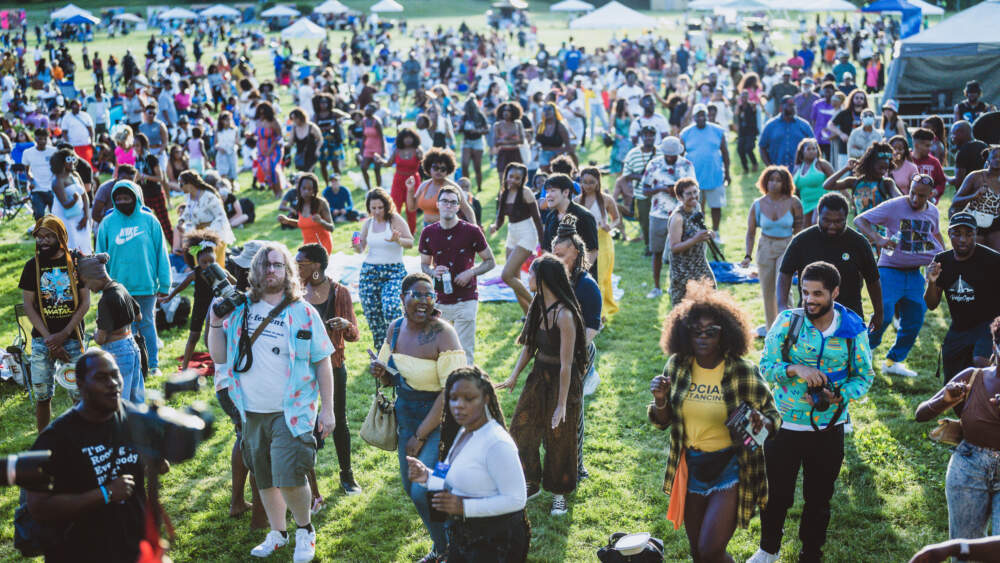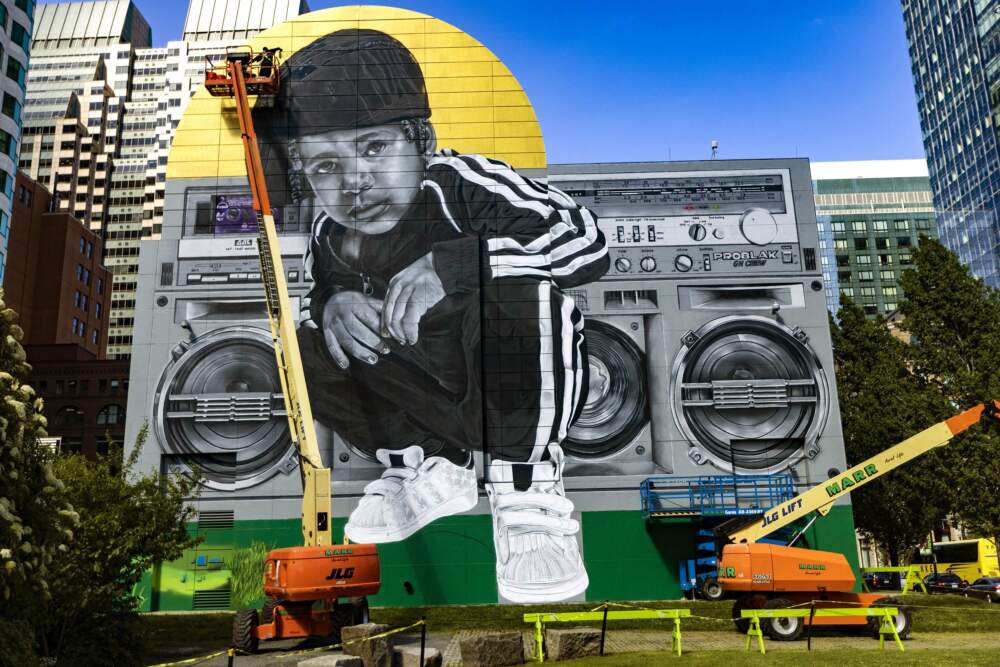Advertisement
Commentary
Boston has soul. Let me show you

Editors’ note: Catherine T. Morris has been preparing for the work she does now for her entire life. A child of Jamaica Plain and Roxbury, she remembers art and music always being part of the conversation at home: She can recall her mom piecing together the family stereo system, blaring funk, disco and soul; her father (who did residential painting and wallpapering) teaching her about color theory. At Lincoln-Sudbury High School — which she attended as a student in the METCO program — Catherine started Universal Rhythm, an event that evolved into a regular showcase of Black METCO students’ experiences through the arts. Her friends joke it was the precursor to BAMSFest, the Boston Art and Music Soul Festival.
This year marks the sixth year that the Festival will convene Afro-centric multidisciplinary artists for two days of art, music, dance and food. Some 10,000 people are expected to attend the festivities in Franklin Park. But the annual June event is only part of what BAMSFest does as a nonprofit organization that aims to break down racial and social barriers to arts, music and culture.
Catherine is also the director of arts and culture at The Boston Foundation, where she’s made it her mission to challenge all of us to think differently about Boston, and how the city defines itself. “I've never heard the word soul associated with our city, and that frustrates me. We have a lack of creative civic pride,” she says. “If we're going to define ourselves by these big words — world class, champions, innovators — we have to remember that the arts are the grandparents of all of that excellence.”
This piece has been excerpted from a conversation, and edited for length and clarity. – Cloe Axelson and Kate Neale Cooper
"I don’t want people to just look at art. I want them to live in it"
We live in a world where we're measured by our accolades and affiliations — and that sometimes devalues our creativity and imagination. Too many of us think of art as something we did when we were kids. But we were all born into this world as creative beings. And we have opportunities to be creative every day. Creativity lives in the choices we make — which phone we buy, which pen we use, what clothes we wear. It’s how we express our feelings and emotions. We literally live in art.
And when we recognize that, the urgency of supporting and embracing the arts, demanding more art, requiring art, becomes much more intense and a responsibility. I don’t want people to just look at art. I want them to live in it.

If the art is music, that means getting up out of your seat and dancing. It's okay to frolic in the grass. It's okay to roll around. It's okay to dance in a historical space that has never invited you in. People have to be given permission to be themselves. And in Boston that has been dictated by the institutions that have historically influenced and shaped where we go and what we do to have fun.
The thing I want to see is more creative freedom. The freedom to be yourself, the freedom to express yourself, the freedom to connect with people in a way that isn’t limited by your title or affiliations. But just to be human — with all of humanity’s amazing possibilities — especially in a city like Boston.
"Art doesn't hurt our city. It transforms our city."
I'm a public servant to the arts. But the work that I'm doing is around systems change, because the system we’re working with is broken. The permitting process is a good example. When it comes to allowing, accepting and encouraging creative pursuits that would truly help our city look different and feel different, we block that process and representation. We pride ourselves on being an innovative, world-class city, but then we throw up barriers like this grueling process to get a permit for an arts project.
We treat the arts like a construction project. Folks have to be willing to not just come to the table, but to sit in a different chair at that table. We need a new perspective: Art doesn't hurt our city. It transforms our city.
Look at Rob Gibbs’ mural on the Rose Kennedy Greenway. That was a huge win. But it took years to get it there. We need more large-scale murals that cover our city like a blanket. Public art actually gives more people a reason to visit, it centers belonging, it drives foot traffic for small businesses, maybe even gets people to move here. But if there isn’t a desire to have a radical public representation and discourse about art, then we’re just a pass-through city that embellishes who we are. And I’m not going to stand for that.
Advertisement

"Every iteration of the festival is a new generation of artists"
I would definitely say I’m a hype woman — I’m Boston’s hype woman. I grew up going to Skippy White's, Nubian Ocean, Funky Fresh Records, Mattapan Records, Tower Records and Cheapo Records. Those places were our Starbucks. We saw movies at the theater in Copley Center and hanging out at Downtown Crossing was a big thing.
That's the Boston I remember — and I work very hard to pay homage to it by integrating that sense of belonging that I grew up with, into BAMS Fest.
At least once a summer as a kid, I'd get up at 6:00 a.m. with my family and go over to American Legion Highway, where the outdoor grills were. By noon or 1:00 p.m. when the cookout started, people from different parts of the neighborhood would start stopping by. I saw old friends and made new ones. I found out about folks I didn't even realize I was related to. That dedication to holding space to break bread with friends and family — and even strangers — is something I wanted to bring into the festival experience.
When I was a kid, community centers hosted lots of talent shows. You wanted to see the best from every neighborhood, so you could go home and work hard to be better than those guys at the next show. People validated your creativity through these shows: If you got the loudest applause, you had bragging rights for the year. I wanted to bring that excitement, that inspiration to BAMSFest. Every iteration of the festival is a new generation of artists, and there's someone in the audience — young, established or mid-career — that gets inspired and thinks, “I want to be on that stage.”
Growing up, there was this store at Blue Hill Avenue and Moreland Street, a corner bodega. It had everything you needed, but also the owners were folks you knew and they knew you. They watched out for the kids and helped families get through difficult times. Small businesses are an integral part of our growth and development as a community and a city, and that’s another element that I wanted to bring to this festival.
"We’ve got artist collectives, jam sessions, circus arts, a street dance community and street art"
I've never heard the word soul associated with our city and that frustrates me. We have a lack of creative civic pride. In Boston, art is a nicety; it's not a required must-have. We’re a city of champions, but the idea of champions needs to be broadened beyond the Red Sox and the Celtics. If we're going to define ourselves by these big words — world-class, champions, innovators —we have to remember that the arts are the grandparents of all of that excellence.
Ten years ago when I was talking about a festival, no one believed I could make it happen. No one believed it was possible because it's Boston. People have such a narrow view of Boston, and that's been so hard to fight, but we’re doing it.
We need to turn the volume up on the megaphone and shine more light on [art's] urgency and impact.
I’m thinking about folks like Tim Hall, an amazing musician, entrepreneur and educator. Ife Franklin, who is doing amazing work with African rituals and art making. Folks like Valerie Stephens, who is elevating blues, hip-hop and jazz in a revolutionary way in a city that hasn't historically welcomed blues and jazz. Chanel Thompson and Shaumba-Yandje Dibinga, who are ensuring that Caribbean roots and dance aren't forgotten by teaching them to young people, helping them understand their history and how movement allows us to connect. I think it's folks like D. Ruff, an amazing spoken word artist who is telling stories through the perspective of being a father raising Black boys in Boston, and folks like Amanda Shea, who is curating spaces for the next generation to be able to tell their story.
We need to continue to interweave arts and culture into the narrative of our city, but we also need to expand this narrative and ideology beyond the traditional arts and culture institutions we always hear about. We’ve got artist collectives, jam sessions, circus arts, a street dance community and street art. We need to turn the volume up on the megaphone and shine more light on its urgency and impact. We need to make it easier to purchase local art.
We're at a critical time and point to challenge Boston’s identity. To show people that Boston has soul.
